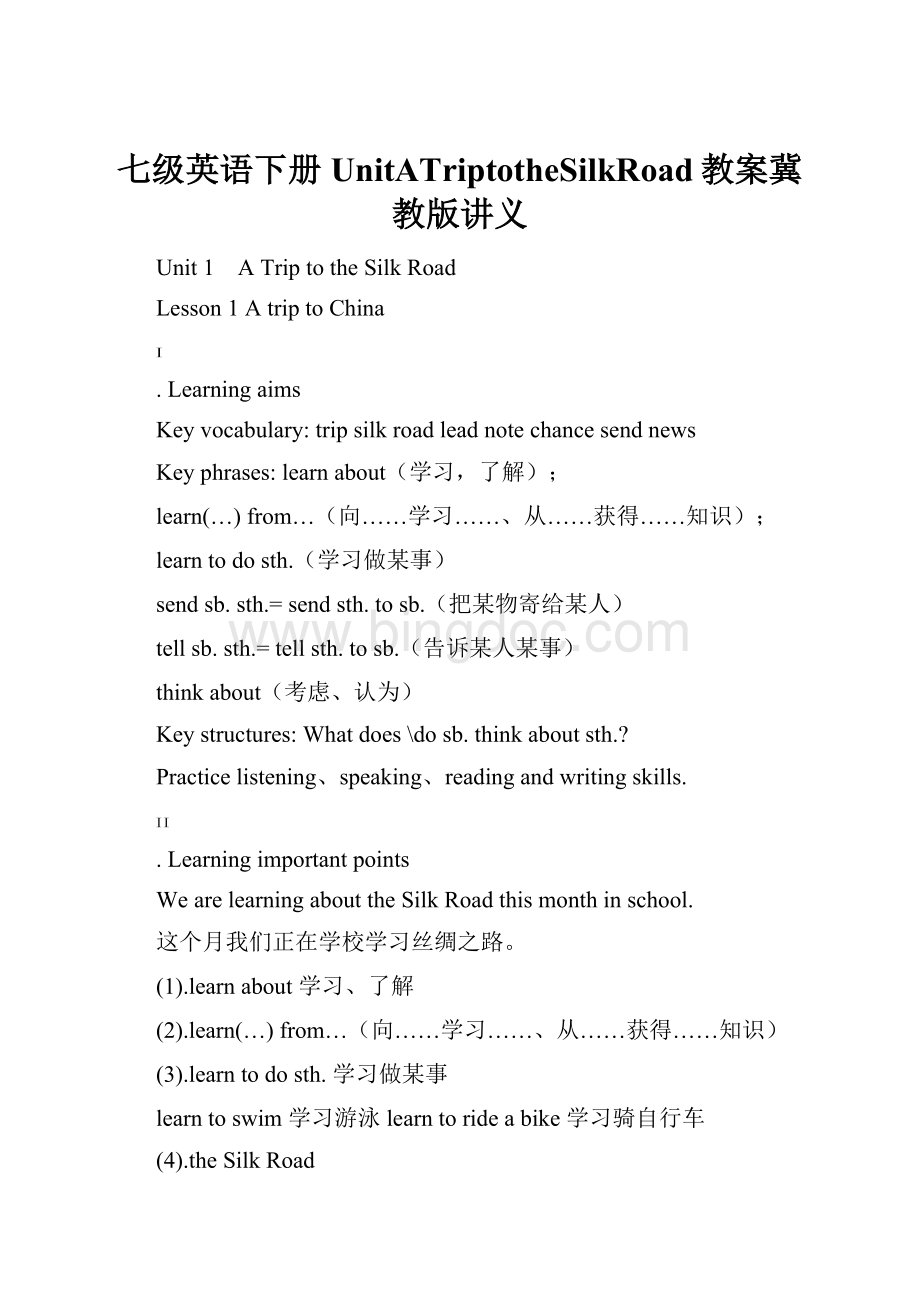七级英语下册UnitATriptotheSilkRoad教案冀教版讲义.docx
《七级英语下册UnitATriptotheSilkRoad教案冀教版讲义.docx》由会员分享,可在线阅读,更多相关《七级英语下册UnitATriptotheSilkRoad教案冀教版讲义.docx(62页珍藏版)》请在冰点文库上搜索。

七级英语下册UnitATriptotheSilkRoad教案冀教版讲义
Unit1 ATriptotheSilkRoad
Lesson1AtriptoChina
.Learningaims
Keyvocabulary:
tripsilkroadleadnotechancesendnews
Keyphrases:
learnabout(学习,了解);
learn(…)from…(向……学习……、从……获得……知识);
learntodosth.(学习做某事)
sendsb.sth.=sendsth.tosb.(把某物寄给某人)
tellsb.sth.=tellsth.tosb.(告诉某人某事)
thinkabout(考虑、认为)
Keystructures:
Whatdoes\dosb.thinkaboutsth.?
Practicelistening、speaking、readingandwritingskills.
.Learningimportantpoints
WearelearningabouttheSilkRoadthismonthinschool.
这个月我们正在学校学习丝绸之路。
(1).learnabout学习、了解
(2).learn(…)from…(向……学习……、从……获得……知识)
(3).learntodosth.学习做某事
learntoswim学习游泳learntorideabike学习骑自行车
(4).theSilkRoad
2.Mumanddad,mayIaskyouaquestion?
爸爸妈妈,我可以问你们一个问题吗?
MayI…?
此句式表达有礼貌地请求对方允许,语气十分委婉,还可以表达为:
CouldI\CanI?
其肯定回答常用:
Yes.可以。
\Sure.\Certainly.当然可以。
否定回答为:
I`msorry,youcan`t.抱歉,不行。
\I`msorry,but…抱歉,但……\You`dbetternot.你最好别这样。
3.Whowillleadthetrip?
lead用作及物动词,意为“带领、指路”。
其过去式led,名词为leader(l领导者、领先者)。
4.Hereisthenotefrommyschool.这是我们学校的信笺。
note用作可数名词,意为“信笺、笔记”。
(1).make\takenotes意为“做笔记”。
(2).leavesb.anote意为“给某人留便条”。
5.IwillsendLiMingane-mailandtellhimthegoodnews.
我将给李明发电子邮件,告诉他这个好消息。
(1).send及物动词,“寄,送”,过去式为sent。
sendsb.sth.=sendsth.tosb.意为“把某物寄给某人”
(2).tellsb.sth.=tellsth.tosb.意为“告诉某人某事”
6.WhatdoesMrs.Smiththinkaboutthetrip?
史密斯夫人认为这次旅行怎么样?
thinkabout意为“考虑,认为”
7.Thisisagoodchanceforyou.对你来说这是一次很好的机会。
chance用作可数名词,意为“机会、运气”。
.Learningdifficultpoints
1.MyschoolisplaningatriparoundChinawithLiMing`sschool.
(1).trip用作可数名词,意为“旅行、旅程”,通常指短距离的旅行。
trip名词,一般用语,侧重于“短途旅行”。
travel名词,泛指旅行的过程
(2).around用作介词,意为“遍及、全”,后跟表示地点的名词,aroundChina意为“中国各地”,相当于alloverChina。
2.SomestudentsfrommyclasswillgotoChinaandtravelontheSilkRoad.
我班里的一些学生会去中国,在丝绸之路上旅行。
本句是一般将来时,一般将来时用于描述将要发生的动作或存在的状态。
它的基本结构是“will+动词原形”。
Wewillgetthereontime.
will结构的句式变化是:
肯定句
主语+will+动词原形+其他
否定句
主语+willnot\won`t+动词原形+其他
一般
疑问句
Will+主语+动词原形+其他?
肯定答语:
Yes,主语+will.
否定答语:
No,主语+won`t.
特殊
疑问句
特殊疑问句+will+主语+动词原形+其他?
例如:
ShewilljointheEnglishclub.
Shewon`tjointheEnglishclub.
WillshejointheEnglishclub?
Yes,shewill.
No,shewon`t.
Wherewillshego?
3.IwillsendLiMingane-mailandtellhimthegoodnews.
我会给李明发一份电子邮件,告诉他这个好消息。
news是不可数名词,意为“新闻、消息”。
可用piece表示其数量,例如:
“一则新闻”apieceofnews。
“两则新闻”twopiecesofnews。
.LearningGuide
.AutonomicLearning
1.Reviewandlearnthenew.
(1).Fillintheblanksandlearnthekeyvocabulary.
Youwillhaveagood____(旅行).
Myfatheriswearinga____(丝绸)shirt.
Therearesomecarsandbusesonthe____(公路).
Don`tworry.Iwill____(带路)thewayforyou.
Thatwillbeagood____(机会)foryou.Don`tmissit.
Isthereany____(新闻)inthenewspaper?
Let`s____(送)abirthdaycardtohim.
Theyaretaking____(笔记)inclass.
(2).Translationandlearnthekeyphrasesandstructures.
今天晚上我会去看电影。
猜怎么着!
这个月我们在学校学习有关丝绸之路方面的知识。
我会发一份电子邮件给李明,告诉他这个好消息。
你知道那则新闻吗?
我班里的一些学生会去中国,在丝绸之路上旅行。
史密斯夫人认为这次旅行怎么样?
(3).Listenandwritetrueorfalseinordertoknowmoreaboutthelesson.
JennyislearningabouttheSilkRoadthismonthinschool.()
LiMing`sschoolisplaningatriptoCanada.()
Ms.MartinwillgotoChinawiththestudents.()
2.Readingmethods
(1).Fullymasterthemeaningofthekeyvocabulary、phrasesandstructuresgiveninlesson1.
(2).Explainthedifficultpointsappearedinlesson1.
3.Studyandreadintensively
(1).Usethekeystructuresofeveryparagraphtoreadeffectively.
(2).Obstaclejumpmethod.Ifyoumeetdifficultproblemsintheprocessofreading,youcanputthemasidetodealwithnewknowledge.Afterthat,youcanconcentrateyourattentiononthatdifficultproblems.
(3).Seize“keypoints”.Itcanbeeffectivetocomprehendthecontentandimplicationsofanessaythoroughlythroughanalysisandconsiderationofkeypoints.
.Dispelsuspicionusingmutualhelp.
1.WearelearningabouttheSilkRoadthismonthinschool.
这个月我们正在学校学习丝绸之路。
(1).learnabout学习、了解
IwanttolearnaboutthehistoryofChina.
(2).learn(…)from…(向……学习……、从……获得……知识)
Wemustlearnfromeachother.
(3).learntodosth.学习做某事
learntoswim学习游泳learntorideabike学习骑自行车
(4).theSilkRoad丝绸之路the是定冠词,此处用在由普通名词组成的专有名词前。
theGreatWall长城theSummerPalace颐和园
2.Mumanddad,mayIaskyouaquestion?
爸爸妈妈,我可以问你们一个问题吗?
MayI…?
此句式表达有礼貌地请求对方允许,语气十分委婉,还可以表达为:
CouldI\CanI?
其肯定回答常用:
Yes.可以。
\Sure.\Certainly.当然可以。
否定回答为:
I`msorry,youcan`t.抱歉,不行。
\I`msorry,but…抱歉,但……\You`dbetternot.你最好别这样。
3.Whowillleadthetrip?
lead用作及物动词,意为“带领、指路”。
其过去式led,名词为leader(l领导者、领先者)。
Theroadleadsyoutothepostoffice.
lead还可用作不及物动词。
Youlead,andI`llfollow.
4.Hereisthenotefrommyschool.这是我们学校的信笺。
note用作可数名词,意为“信笺、笔记”。
(1).make\takenotes意为“做笔记”。
Weshouldmake\takenotescarefullyinclass.
(2).leavesb.anote意为“给某人留便条”。
Helefthissonanoteonthetable.
5.IwillsendLiMingane-mailandtellhimthegoodnews.
我将给李明发电子邮件,告诉他这个好消息。
(1).send及物动词,“寄,送”,过去式为sent。
sendsb.sth.=sendsth.tosb.意为“把某物寄给某人”
Myfriendoftensendsmebooks.
(2).tellsb.sth.=tellsth.tosb.意为“告诉某人某事”
Iwilltellhimmyname.
6.WhatdoesMrs.Smiththinkaboutthetrip?
史密斯夫人认为这次旅行怎么样?
thinkabout意为“考虑,认为”,about是介词,后可跟名词、代词或v.-ing形式。
WhatdoyouthinkaboutSpotsWeekly?
7.Thisisagoodchanceforyou.对你来说这是一次很好的机会。
chance用作可数名词,意为“机会、运气”。
haveachancetodosth.=haveachanceofdoingsth.意为“有机会做某事”,bychance意为“偶然地”。
It`sagoodchancetolearnfromworkers.
8.MyschoolisplaningatriparoundChinawithLiMing`sschool.
(1).trip用作可数名词,意为“旅行、旅程”,通常指短距离的旅行。
Wewillmakeatriptotheseaside.
Haveagoodtrip.
trip名词,一般用语,侧重于“短途旅行”。
HewantstomakeatriptotheGreatWall.
travel名词,泛指旅行的过程
(2).around用作介词,意为“遍及、全”,后跟表示地点的名词,aroundChina意为“中国各地”,相当于alloverChina。
Peoplearoundtheworldlovepeace.
9.SomestudentsfrommyclasswillgotoChinaandtravelontheSilkRoad.
我班里的一些学生会去中国,在丝绸之路上旅行。
本句是一般将来时,一般将来时用于描述将要发生的动作或存在的状态。
它的基本结构是“will+动词原形”。
Wewillgetthereontime.
will结构的句式变化是:
肯定句
主语+will+动词原形+其他
否定句
主语+willnot\won`t+动词原形+其他
一般
疑问句
Will+主语+动词原形+其他?
肯定答语:
Yes,主语+will.
否定答语:
No,主语+won`t.
特殊
疑问句
特殊疑问句+will+主语+动词原形+其他?
例如:
ShewilljointheEnglishclub.
Shewon`tjointheEnglishclub.
WillshejointheEnglishclub?
Yes,shewill.
No,shewon`t.
Wherewillshego?
10.IwillsendLiMingane-mailandtellhimthegoodnews.
我会给李明发一份电子邮件,告诉他这个好消息。
news是不可数名词,意为“新闻、消息”。
可用piece表示其数量,例如:
Doyouknowthenewsaboutthefire?
“一则新闻”apieceofnews。
“两则新闻”twopiecesofnews。
.Inquiriesandsuggestions.
1.WhatisJenny`sschoolplaning?
2.Whowillleadthetrip?
3.WhatdoesMrs.Smiththinkaboutthetrip?
4.WhywillJennysendLiMingane-mail?
5.WhatisJennylearningaboutthismonthinschool?
.Groupwork.
Setansituationandaskthestudentstomaketheirownconversationsingroupsandactthemout.
.Expandandimprove.
1.IhopeTimcancometomybirthdayparty.Thenwe____amuchhappiertime.
A.haveB.hadC.willhaveD.havehad
2.Letmetellyou____newsaboutcellphones(手机).
A.AB.manyC.someD.few
3.Please_____thisbook_____myteacher.
A.send;toB.give;\C.send;forD.give;for
4.What____hethink____thetrip?
A.do;\B.does;\C.does;aboutD.do;about
5.--Doyouhaveanyplansforyourwintervacations?
--I____forHainannextSunday.
A.leaveB.willleaveC.leavingD.left
.Finishthetask.
1.Fillintheblankswiththelearndwords.
(1).Iplantogoona____toBeijingthissummer.
(2).Ihavesomegood____foryou.
(3).Manypeople____toHainanfortheirwinterholiday.
(4).Followme!
Iwill____youthere.
(5).IwanttogotoBeijing.ThenIwillhavea____toseetheGreatWall.
.Challenge
1.Readthenotegivenonpage3fromJenny`sschoolandtaketurnsaskingforpermissiontogoonthetrip.
Tasktips:
Whatdoyouwanttodo?
Where\Whendoyouwanttogo?
Whowillyougowith?
Notes:
Lesson2MeetyouinBeijing
.Learningaims
Keyvocabulary:
excitingalongkilometrespecialculturearriveleave
Keyphrases:
howfar(多远)
howmany(多少)
from…to…(从……到……)
Keystructures:
Howexciting!
Howfarisitfrom…to…?
It`sabout…kilometres.
TheSilkRoadisabout6500kilometreslong.
Practicelistening、speaking、readingandwritingskills.
.Learningimportantpoints
Howexciting!
太令人激动了!
(1).exciting意为“使人激动的;令人兴奋的”。
是以-ing结尾的形容词。
(2).Thedistinctionsbetweenexcitingandexcited.
excited意为“兴奋的”,用来形容人。
exciting意为“令人兴奋的”,用来修饰物。
1.HowfarisitfromBeijingtoXi`an?
从北京到西安有多远?
(1).问两地之间的距离有多远时,用“Howfarisitfrom…to…?
”,还可以使用“Howfarawayis…from…?
”或“Howmanykilometresisitfrom…to…?
”。
(2).Thedistinctionsbetweenhowfarandhowlong.
howfar问距离有多远。
howlong问时间多久、多长,还可以提问物体的长度。
(3).from…to…
表示从某一地方到另一地方。
例如:
fromChinatoCanada
表示从某一时间到另一时间。
例如:
HeoftenwatchesTVfromseveno`clocktonineo`clockintheevening.
3.TheSilkRoadisabout6500kilometreslong!
丝绸之路长约6500千米!
常见的度量单位有metre(米)、kilometre(千米)、foot(英尺)、mile(英里)等。
常见的用于给结构的形容词有long(长)、wide(宽)、tall(高)、deep(深)等。
例如:
Theriverisfivemetresdeep.
Theroadis2000kilometreslong.
4.ArriveinBeijingandtakeatraintoXi`an.
到达北京,乘火车去西安。
arrive意为“到达”。
当表示到达某地时,arrive后要加介词in或at。
到达较大的地方,如北京、上海等用in;到达较小的地方,如车站、学校、市场等用at。
例如:
WewillarriveinShanghaionJanuary7th.
arrive、getandreach
arrive
是不及物动词,其后若跟地点名词,要用arrivein或arriveat。
get
是不及物动词,其后若跟地点名词,要用getto。
reach
是及物动词,其后可以直接跟地点名词。
例如:
ShefinallyarrivedinNewYork.
WewillgettoBeijingtomorrow.
Lisawillreachthevillagesoon.
当arrive后接home、there、here等地点副词时,需去掉介词。
例如:
Iwillarriveherenextweek.
5.ComebacktoBeijingandleaveBeijing.